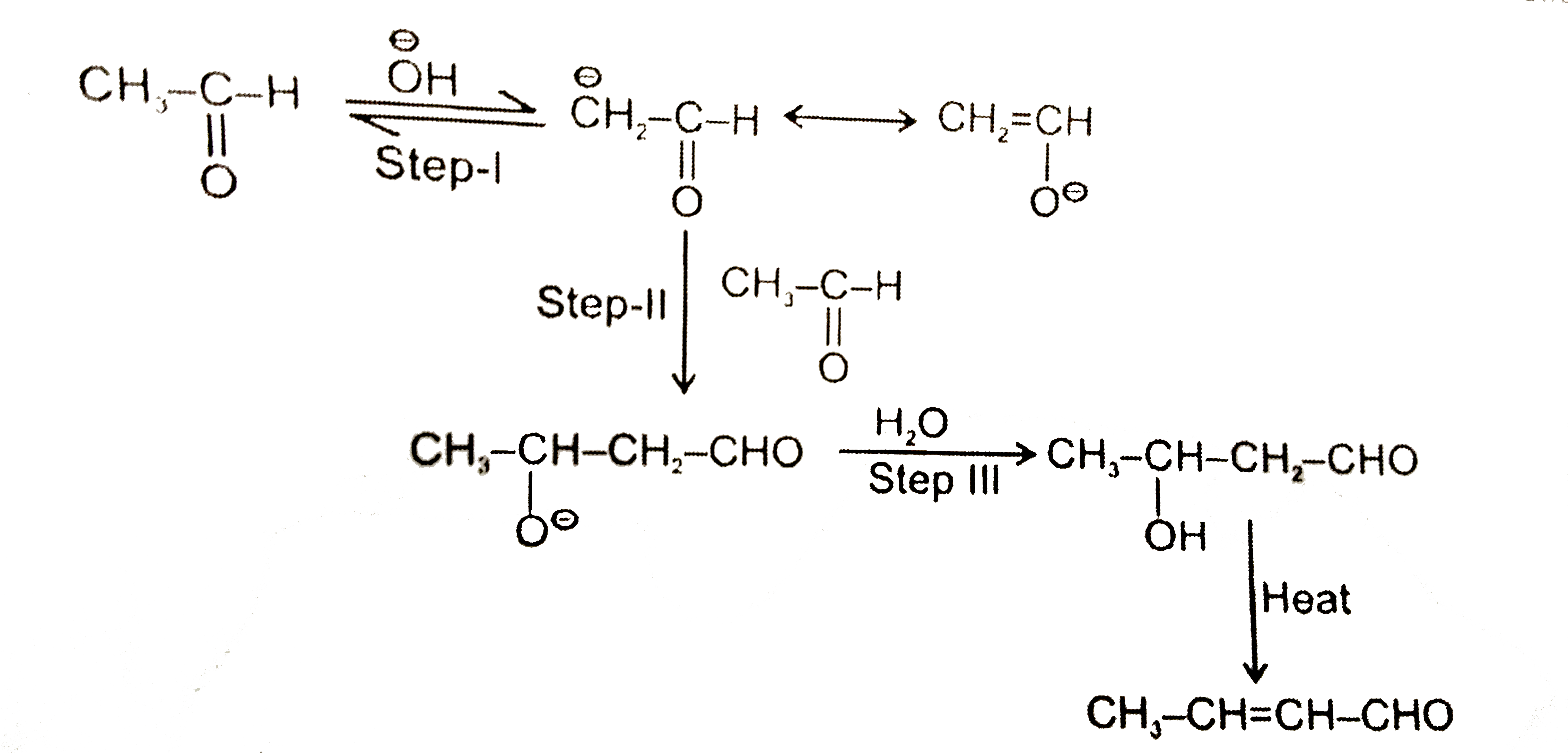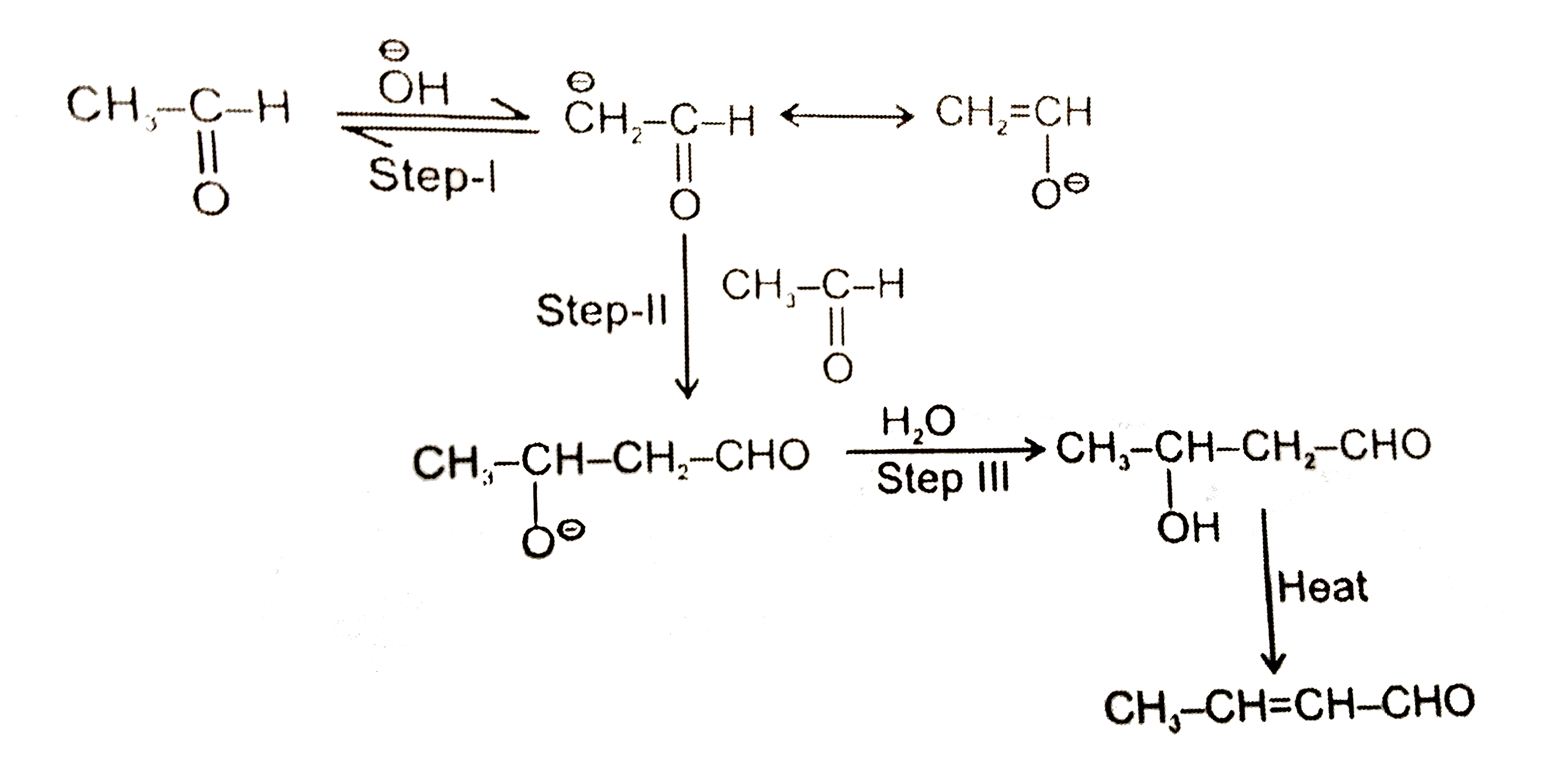Ethanal and propanone undergo condensation reaction in presence of dil. Alkali to form
CH3CH(OH)CH2COCH3
CH3−CO−C(OH)(CH3)2
HOH2CCH2CH2COCH3
CH3COCH(CH3)CH2OH
The correct Answer is:A
To solve the question regarding the condensation reaction between ethanal (acetaldehyde) and propanone (acetone) in the presence of dilute alkali, we can follow these steps:
Step 1: Identify the Reactants
- Ethanal (acetaldehyde) has the formula: CH3CHO
- Propanone (acetone) has the formula: CH3COCH3
Step 2: Understand the Role of Dilute Alkali
- In the presence of dilute alkali (like NaOH), a condensation reaction occurs. The base will abstract a proton (H⁺) from the reactants, leading to the formation of enolate ions.
Step 3: Formation of Enolate Ions
- When ethanol (CH3CHO) reacts with dilute alkali, it forms an enolate ion:
CH3CHONaOH−−−→CH2=C(OH)O−
- Similarly, propanone (CH3COCH3) will also form an enolate ion:
CH3COCH3NaOH−−−→CH2=C(OH)O−
Step 4: Nucleophilic Attack
- The enolate ion formed from propanone acts as a nucleophile and attacks the carbonyl carbon of ethanal:
CH2=C(OH)O−+CH3CHO→CH3C(OH)(CH2C=O)CH3
Step 5: Protonation and Final Product Formation
- After the nucleophilic attack, the intermediate formed will undergo protonation to yield the final product:
CH3C(OH)(CH2C=O)CH3H+−−→CH3C(=O)CH2C(=O)CH3
Final Product
- The final product of the condensation reaction between ethanal and propanone in the presence of dilute alkali is:
4-hydroxy-4-methylpentan-2-one (or diacetone alcohol)
Summary of the Reaction
The condensation of ethanal and propanone in the presence of dilute alkali results in the formation of 4-hydroxy-4-methylpentan-2-one.
---
- Ethanal (acetaldehyde) has the formula: CH3CHO
- Propanone (acetone) has the formula: CH3COCH3
- In the presence of dilute alkali (like NaOH), a condensation reaction occurs. The base will abstract a proton (H⁺) from the reactants, leading to the formation of enolate ions.
- When ethanol (CH3CHO) reacts with dilute alkali, it forms an enolate ion:
CH3CHONaOH−−−→CH2=C(OH)O−
- Similarly, propanone (CH3COCH3) will also form an enolate ion:
CH3COCH3NaOH−−−→CH2=C(OH)O−
- The enolate ion formed from propanone acts as a nucleophile and attacks the carbonyl carbon of ethanal:
CH2=C(OH)O−+CH3CHO→CH3C(OH)(CH2C=O)CH3
- After the nucleophilic attack, the intermediate formed will undergo protonation to yield the final product:
CH3C(OH)(CH2C=O)CH3H+−−→CH3C(=O)CH2C(=O)CH3
- The final product of the condensation reaction between ethanal and propanone in the presence of dilute alkali is:
4-hydroxy-4-methylpentan-2-one (or diacetone alcohol)
The condensation of ethanal and propanone in the presence of dilute alkali results in the formation of 4-hydroxy-4-methylpentan-2-one.
Similar Questions
An unknown aldehyde [A] on reacting with alkali gives β-hydroxyaldehyde which loses water to form an unsaturated but-2-enal. Another aldehyde [B] undergoes disproportionation reaction in the presence of conc. Alkali to form products [C] and [D]. The compound [C] is an aryl alcohol with formula C7H8O.
(i) Identify [A] to [B]. , (ii) Write the sequence of reactions involved.
(iii) Name the proucts when , [B] reacts with zinc amalgam and hydrochloric acid.
View SolutionWhich undergoes aldol condensation in the presence of dilute NaOH?
View Solution
Knowledge Check
Which of the following compounds will undergo self aldol condensation in the presence of cold dilute alkali ?
ACH≡C−CHOBCH2=CHCHOCC6H5CHODCH3CH2CHOWhich of the following reactions will undergo an elimination reaction and an alkene will be formed in the product?
A B
B C
C D
D
Acetone on condensation with chloroforms in presence of caustic potash forms :
View SolutionCarbonyl compound which contains α−H gives aldol condenation reaction in presence of alkaline medium. The reaction between two molecules of acetaldehyde take placeas follows in presence of base

Intramolecular aldol condensation reaction is given by
View SolutionCarbonyl compound which contains α−H gives aldol condenation reaction in presence of alkaline medium. The reaction between two molecules of acetaldehyde take placeas follows in presence of base

Aldol condensation reaction is given by
View SolutionExplain :
Ethyl isobutyrate does not undergo Claisen condensation in the presence of NaOEt.
View SolutionBenzaldehyde reacts with formaldehyde in the presence of alkali to form:-
View SolutionEthanal undergoes aldol condensation but trichloroethanal does not.
View Solution
